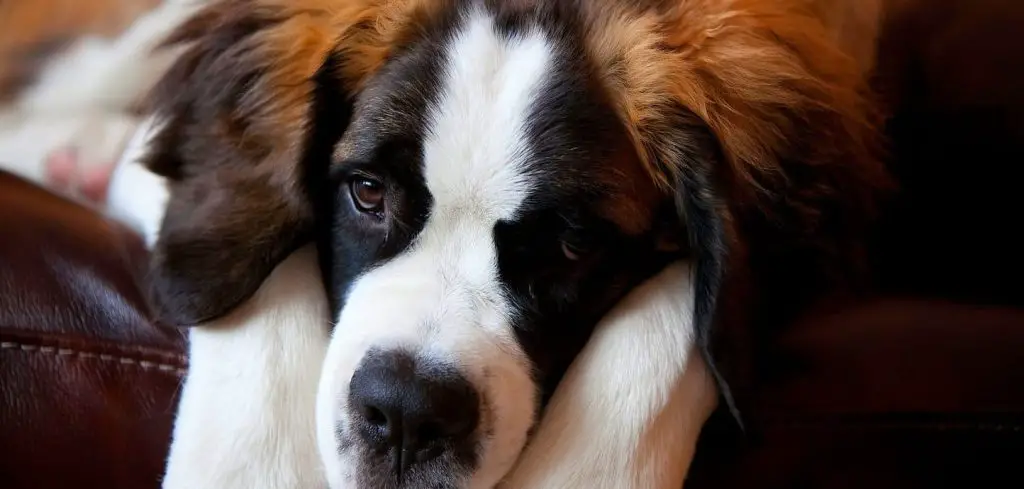Noticing your old dog breathing heavy can be alarming, especially if it happens at rest or without obvious cause.
Heavy breathing, or labored respiration, often signals an underlying health condition that needs attention.
We outline the common causes of heavy breathing in an old dog, what you can do at home, and when to seek veterinary help.
Old Dog Breathing Heavy — Why It Happens
Heavy breathing in old dogs can be due to heart disease, respiratory illness, pain, heat stress, or even anxiety. Because older dogs are more vulnerable to health complications, recognizing the reason behind the symptom is important for keeping them safe and comfortable.

Old Dog Breathing Heavy: Common Causes
Heart Disease
Heart problems are a leading cause of heavy breathing in older dogs.
When the heart can’t pump efficiently, fluid builds up in the lungs. This makes breathing harder, and you may notice your dog panting even at rest, coughing, or tiring quickly on walks.
Congestive heart failure is especially common in senior dogs and requires prompt veterinary care. Left untreated, it can quickly become life-threatening.
Read more: Old Dog Breathing Heavy and Not Eating (Here’s why)
Respiratory Conditions
Lung and airway diseases also contribute to heavy breathing.
Chronic bronchitis, pneumonia, or tracheal collapse reduce airflow, forcing your dog to work harder just to get oxygen. Signs often include noisy breathing, wheezing, or frequent coughing.
Brachycephalic breeds like Pugs and Bulldogs may worsen with age as their airways narrow, making every breath a struggle.
Pain or Discomfort
Pain is a less obvious but very real cause of heavy breathing in old dogs.
When a dog is in pain from arthritis, cancer, or an injury, they may breathe faster and heavier as their body reacts to stress. This type of breathing is usually shallow and may be accompanied by restlessness, trembling, or changes in posture.
Because pain is often underestimated in senior dogs, this cause should never be overlooked.
Heat Stress
Older dogs are especially prone to overheating, which shows up first as heavy panting.
Unlike people, dogs rely on panting to regulate body temperature. On hot days or after exercise, an old dog may start panting heavily as their body struggles to cool down. If not addressed, this can escalate to heatstroke—a life-threatening emergency.
Large breeds, overweight dogs, and those with thick coats are at even greater risk.
Anxiety and Stress
Emotional stress can trigger heavy breathing, even without a physical cause.
Older dogs may develop new anxieties, such as separation distress or fear of loud noises. Heavy panting during thunderstorms, fireworks, or vet visits is often linked to stress.
If anxiety is the culprit, the heavy breathing typically eases once the stressful event passes. Still, chronic anxiety should be addressed for your dog’s overall wellbeing.
Other Medical Conditions
A range of other health issues can also make an old dog breathe heavily.
Metabolic diseases like Cushing’s disease increase panting, while obesity puts extra strain on the lungs and heart. Anemia can also force the body to breathe harder to make up for low oxygen levels.
Because the causes are so varied, veterinary evaluation is key when this symptom appears.
What to Do If Your Old Dog Is Breathing Heavily
If your old dog is breathing heavy, first create a calm and safe environment.
Move them to a cool, quiet space with good airflow. Offer water, reduce physical activity, and keep them from overheating.
Observe whether the breathing improves with rest, or if it continues even while your dog is relaxed. Keeping a record of when it happens—after walks, at night, during hot weather—can help your vet identify the cause.
Do not give human medications to your dog, as these can worsen the problem. Instead, focus on comfort until you can consult your veterinarian for proper treatment.
When to Call or Visit Your Vet
You should seek veterinary care promptly if your old dog’s heavy breathing is new, persistent, or severe.
Contact your vet immediately if your dog is breathing heavily at rest, has blue-tinged gums, or seems unable to catch their breath. These are signs of an emergency.
Also call your vet if heavy breathing is paired with coughing, fainting, weakness, or loss of appetite. These could indicate heart or lung disease that needs urgent management.
If your dog pants excessively even in cool conditions, or shows signs of distress and restlessness, do not delay scheduling a veterinary appointment.
Read more: Old Dog Coughing (What you should know)
Key Takeaway
Old dogs breathing heavy should never be ignored, even if it seems occasional.
From heart disease and respiratory illness to heat stress or pain, the causes can be serious and often require veterinary care. By watching for changes, providing a calm environment, and seeking timely treatment, you can protect your senior dog’s health and quality of life.
With proper care and early attention, many old dogs can continue enjoying their golden years more comfortably.
